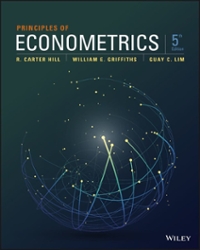VAR and VEC models are popular forecasting models because they rely on the past history of observed
Question:
VAR and VEC models are popular forecasting models because they rely on the past history of observed outcomes to predict the expected future values.
a. Consider the following estimated VAR model:
\[\begin{aligned}& y_{t}=\hat{\delta}_{11} y_{t-1}+\hat{\delta}_{12} x_{t-1}+\hat{v}_{1 t} \\& x_{t}=\hat{\delta}_{21} y_{t-1}+\hat{\delta}_{22} x_{t-1}+\hat{v}_{2 t}\end{aligned}\]
What are the forecasts for \(y_{t+1}\) and \(x_{t+1}\) ?
What are the forecasts for \(y_{t+2}\) and \(x_{t+2}\) ?
b. Consider the following estimated VEC model:
\[\begin{aligned}& \Delta y_{t}=\hat{\alpha}_{11}\left(y_{t-1}-\hat{\beta}_{1} x_{t-}\right)+\hat{v}_{1 t} \\& \Delta x_{t}=\hat{\alpha}_{21}\left(y_{t-1}-\hat{\beta}_{1} x_{t-1}\right)+\hat{v}_{2 t}\end{aligned}\]
What are the forecasts for \(y_{t+1}\) and \(x_{t+1}\) ?
What are the forecasts for \(y_{t+2}\) and \(x_{t+2}\) ?
Step by Step Answer:

Principles Of Econometrics
ISBN: 9781118452271
5th Edition
Authors: R Carter Hill, William E Griffiths, Guay C Lim





